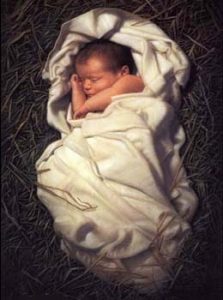Nerys writes:
As you know, my native Wales is a bi-lingual country. Road signs appear in Welsh and in English. The translations usually make sense but a few years ago I saw a temporary sign near Cardiff where instead of being asked to dismount, Welsh speaking cyclists were instructed to ‘overthrow cystitis’. Not far away in the Vale of Glamorgan there was a sign that urged drivers to ‘follow the entertainment’ rather than take a diversion. I remember a quarry sign in Gwynedd which warned in English that blasting was in progress but in Welsh that ‘workers were exploding’. And there is a shop sign near my brother’s home on Anglesey which advertises in Welsh ‘wine and ghosts’ rather than wine and spirits.

It is so easy for meaning to be lost in translation. It can also be lost through familiarity. We hear the same passages of scripture year after year at Christmas and often, because we know the words so well, we stop listening for the message. This is true of the Gospel for today, John 1.1-14, which is full of truth and beauty if only we could hear it as if for the first time. So in order to help you to do that, I offer you a version that is probably unfamiliar to you. The Message by Eugene Peterson is a paraphrase rather than a word-for-word translation. It uses language and imagery drawn from contemporary culture to convey the ideas and concepts of the text.
Before you read the passage, I invite you to still your hearts so that you hear God speaking to you through it.
The Word was first,
the Word present to God,
God present to the Word.
The Word was God,
in readiness for God from day one.
Everything was created through him;
nothing—not one thing!—
came into being without him.
What came into existence was Life,
and the Life was Light to live by.
The Life-Light blazed out of the darkness;
the darkness couldn’t put it out.
There once was a man, his name John, sent by God to point out the way to the Life-Light. He came to show everyone where to look, who to believe in. John was not himself the Light; he was there to show the way to the Light.
The Life-Light was the real thing:
Every person entering Life
he brings into Light.
He was in the world,
the world was there through him,
and yet the world didn’t even notice.
He came to his own people,
but they didn’t want him.
But whoever did want him,
who believed he was who he claimed
and would do what he said,
He made to be their true selves,
their child-of-God selves.
These are the God-begotten,
not blood-begotten,
not flesh-begotten,
not sex-begotten.
The Word became flesh and blood,
and moved into the neighborhood.
We saw the glory with our own eyes,
the one-of-a-kind glory,
like Father, like Son,
generous inside and out,
true from start to finish.
I wonder if a particular word or a phrase struck you as you read? I wonder what God is saying to you through it? I suggest that you make a mental note of it and make time to return to it over the next few days.
For me, when I read this paraphrase for the first time, it was, ‘The Word … moved into the neighborhood’ that jumped out at me. Eugene Peterson’s homely American phrase sounded so incongruous in this poetic, mysterious overture to John’s Gospel that it set me scurrying away to examine the text again.
Most modern translations say that the Word ‘made his dwelling’ or ‘lived’ or ‘made his home’ among us but the Greek verb literally means ‘lived in a tent’. It’s from the term used for the tent of the tabernacle which represented the presence of God among the people of Israel. When they were wandering in the wilderness, Moses met with God on Mount Sinai and was given instructions concerning the tent that was to be built. ‘Have them make a sanctuary for me’, says God, ‘and I will dwell among them’. This tabernacle guided the people in the wilderness, leading them into the Promised Land. Eventually, it was incorporated into the Temple in Jerusalem. Hidden deep inside the temple courts, it was accessible only to a few and the intimacy of God dwelling among his people was lost. Down the centuries, prophets like Isaiah longed for God to return to Jerusalem to ‘pitch his tent’ among his people again. And now, John is declaring that God has chosen to ‘tabernacle among us’ in a new way, to become flesh and blood, to appear as a human baby in a manger in Bethlehem.

On the one hand, this is an astonishing surrender of power – God choosing to be confined in human form. The Creator of the Universe emptying himself to shrink to the size of a tiny helpless baby. On the other hand, when the tabernacle is a living, breathing, human being, we humans cannot pretend to be in control of God’s presence. It can’t be carted around from place to place. It can’t be confined it to a holy building with controlled access. But do we want a God like this? A God who became flesh and blood. A God who moved into our neighbourhood? A God who can turn up at any time to call us to prayer or action. A God who knows us intimately, who will challenge us to change our priorities, to look afresh at our relationships, to see our world through different eyes. How do we respond to this uncomfortable, inconvenient, uncontrollable God?
In the beginning – you were.
In this moment – you are.
You are strength and weakness.
You are light and glory.
You are God and you welcome us:
You listen for our prayers …
We pray today for peace, peace in Bethlehem, peace in the dark places of our world. We pray for leaders and negotiators, for peacemakers and peacekeepers, for fighters and prisoners, for all who are caught up in conflict, violence and fear. We pray for peace with integrity and with justice.
We pray for children everywhere, for the newly born, for those growing up among us, for those growing up in places where there is poverty and danger. We pray that they may be loved and welcomed and that they may know smiles and hope.
We pray for all who sit and eat with us today. We thank you for our families, for our friends, for those who love us, for those who share our laughter and pain. We pray for those who, by choice or by circumstance, eat alone. And we pray for justice for those who are hungry.
We pray for all who are sick and for those who care for them and pray for them. We pray for those who have died, for those we miss at our table. Tell them how much we love them, we miss them, we carry their stories in our lives.
We pray for ourselves, for our needs, our concerns, our hopes and our dreams. Bright loving God, Emmanuel, God-with-us, help us to recognise you today and to welcome you into our lives in wonder, in truth and in holy joy. Amen
(Adaptation of Bidding Prayers written by Ruth Burgess)






